ECE Hosts Annual Research Symposium, Announces 2025-26 Winners
October 6, 2025
The Department of Electrical and Computer Engineering recently announced the winners of its 2025-26 ECE Research Symposium. The annual symposium is open to all ECE graduate, undergraduate and distance students to showcase their research through poster presentations.
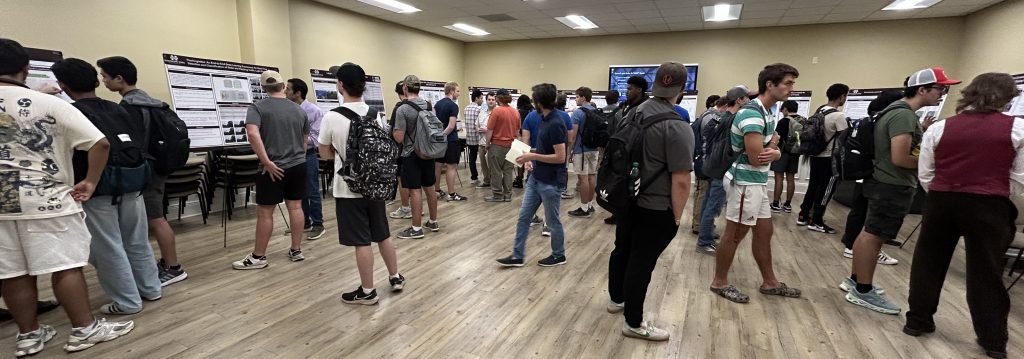
This year’s event was judged by ECE department faculty members Dylan Boyd, Junming Diao, Jenny Du and Chaomin Luo.
First-place winner and graduate student Bruce Hicks said, “I am deeply honored to have received this recognition. I would like to sincerely thank Dr. John Ball and Dr. Ali Gurbuz for their mentorship and guidance, Dr. Sabyasachi Biswas for his cooperation and support throughout this work and Dr. Du for the opportunity to participate in and present this research.”
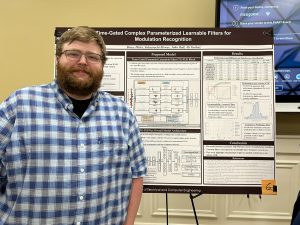
Bruce Hicks
Hicks, whose major professor is John Ball, was recognized with first place for “Time-Gated Complex Parameterized Learnable Filters for Modulation Recognition.” His work presents TG-PLFNet, a physics-informed deep learning model for automatic modulation recognition that operates directly on raw I/Q data. By combining learnable time and frequency filters with complex-valued CNNs, the model achieves high accuracy, efficiency and interpretability across diverse radar and communication signals.
In addition to the first-place award, the panel of judges also presented second and third place.
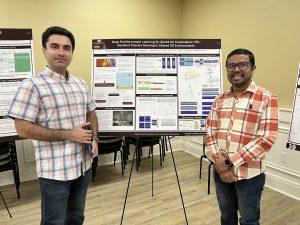
Hossein Mohammadi and Fahad Faisal
Second prize was presented to Hossein Mohammadi and Fahad Faisal, both of whom have Vuk Marojevic as their major professor. They presented “Deep Reinforcement Learning for Spectrum Coexistence: RFI-Resilient Passive Sensing in Shared 5G Environments.”
Their research presents a deep reinforcement learning (DRL) framework for achieving RFI-resilient passive sensing and active–passive spectrum coexistence in shared 5G environments. Using a precision 5G NR testbed and open-source datasets, it demonstrates adaptive spectrum management that mitigates interference impacts on radiometers and other passive sensors.
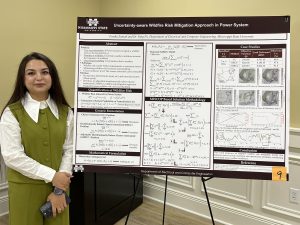
Fasiha Zainab
Fasiha Zainab was recognized with third place for her poster “Uncertainty-Aware Wildfire Risk Mitigation Approach in Power Systems.” Zainab’s major professor is Yong Fu, and her study addressed the growing challenges introduced by power system-induced wildfires and presented a new preventive measure for wildfire risk mitigation in power systems.
The full list of presentations included the following: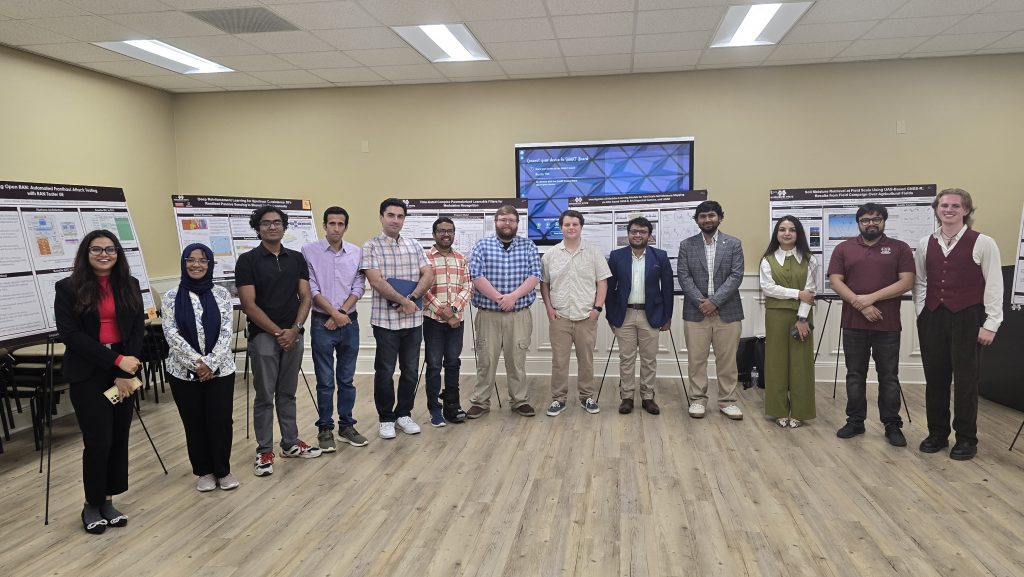
- Attention Enhanced Perceptual Image Anomaly Detection for Ultrasound Imagery
Authors: Sifat Zina Karim, Dr. John Ball
- FlashLightNet: An End-to-End Deep Learning Framework for Real-Time Detection and Classification of Static and Flashing Traffic Light States
Authors: Laith Bani Khaled, Dr. John Ball
- Large-Scale Underwater Multi-Fish Tracking Using the ByteTrack Algorithm
Authors: Iffat Ara Ebu, MM Nabi, Chiranjibi Shah, Dr. John Ball, Dr. Robert Moorhead
- Securing Open RAN: Automated Fronthaul Attack Testing with RAN Tester UE
Authors: Joshua Moore, Dr. Aly Sabri Abdalla, Chase Ueltchsey, Anoop Mishra, Dr. Vuk Marojevic
- Deep Reinforcement Learning for Spectrum Coexistence: RFI-Resilient Passive Sensing in Shared 5G Environments
Authors: Hossein Mohammadi, Fahad Faisal, Dr. Vuk Marojevic, Almed Manavi Alam, Dr. Ali Gurbuz, Kaies Al Mahmud, Dr. Melmet Kurum
Time-Gated Complex Parameterized Learnable Filters for Modulation Recognition
Authors: Bruce Hicks, Sabyasachi Biswas, Dr. John Ball, Dr. Ali Gurbuz
- Investigation of Machine Learning Models for Field Scale Soil Moisture Mapping via UAV-Based GNSS-R, Multispectral Camera, and LiDAR
Authors: Md Ebtidaul Karim, Mohammad Abdus Shahid Rafi, Dr. Volkan Senyurek, Dr. Ali Gurbuz, Dr. John Ball
- Soil Moisture Retrieval at Field Scale Using UAS-Based GNSS-R: Results from Field Campaign over Agricultural Fields
Authors: Md Mehedi Farhad, Dr. Volkan Senyurek, Mohammad Abdus Shahid Rafi, Ardeshir Adeli, Dr. Mehmet Kurum, Dr. Ali Gurbuz
- Uncertainty-Aware Wildfire Risk Mitigation Approach in Power Systems
Authors: Fasiha Zainab, Dr. Yong Fu
- From Conventional to Non-Conventional: Instrument Transformer Technologies Shaping Power Systems
Authors: MD Rashid Hussain, Dr. David Wallace
- ThermLeT: Transformer-based Temperature Prediction for 2.5 D Chiplet Architecture
Authors: Varuhn Parekh, Anusha Devupally, Cassius Herderson, Rodero Biswas
The Department of Electrical and Computer Engineering at Mississippi State University consists of 27 faculty members (including seven endowed professors), seven professional staff, and over 700 undergraduate and graduate students, with approximately 100 being at the Ph.D. level. With a research expenditure of over $14.24 million, the department houses the largest High Voltage Laboratory among North American universities.
